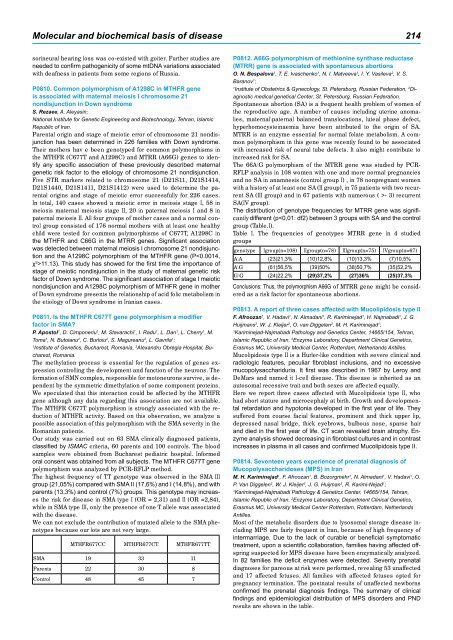European Human Genetics Conference 2007 June 16 – 19, 2007 ...
European Human Genetics Conference 2007 June 16 – 19, 2007 ...
European Human Genetics Conference 2007 June 16 – 19, 2007 ...
You also want an ePaper? Increase the reach of your titles
YUMPU automatically turns print PDFs into web optimized ePapers that Google loves.
Molecular and biochemical basis of disease<br />
sorineural hearing loss was co-existed with goiter. Further studies are<br />
needed to confirm pathogenicity of some mtDNA variations associated<br />
with deafness in patients from some regions of Russia.<br />
P0810. Common polymorphism of A1298C in MTHFR gene<br />
is associated with maternal meiosis I chromosome 21<br />
nondisjunction in Down syndrome<br />
S. Rezaee, A. Aleyasin;<br />
National Institute for Genetic Engineering and Biotechnology, Tehran, Islamic<br />
Republic of Iran.<br />
Parental origin and stage of meiotic error of chromosome 21 nondisjunction<br />
has been determined in 226 families with Down syndrome.<br />
Their mothers hav e been genotyped for common polymorphisms in<br />
the MTHFR (C677T and A1298C) and MTRR (A66G) genes to identify<br />
any specific association of these previously described maternal<br />
genetic risk factor to the etiology of chromosome 21 nondisjunction.<br />
Five STR markers related to chromosome 21 (D21S11, D21S1414,<br />
D21S1440, D21S1411, D21S1412) were used to determine the parental<br />
origins and stage of meiotic error successfully for 226 cases.<br />
In total, 140 cases showed a meiotic error in meiosis stage I, 58 in<br />
meiosis maternal meiosis stage II, 20 in paternal meiosis I and 8 in<br />
paternal meiosis II. All four groups of mother cases and a normal control<br />
group consisted of 176 normal mothers with at least one healthy<br />
child were tested for common polymorphisms of C677T, A1298C in<br />
the MTHFR and C66G in the MTRR genes. Significant association<br />
was detected between maternal meiosis I chromosome 21 nondisjunction<br />
and the A1298C polymorphism of the MTHFR gene (P11.13). This study has showed for the first time the importance of<br />
stage of meiotic nondisjunction in the study of maternal genetic risk<br />
factor of Down syndrome. The significant association of stage I meiotic<br />
nondisjunction and A1298C polymorphism of MTHFR gene in mother<br />
of Down syndrome presents the relationship of acid folic metabolism in<br />
the etiology of Down syndrome in Iranian cases.<br />
P0811. Is the MTHFR C677T gene polymorphism a modifier<br />
factor in SMA?<br />
P. Apostol1 , D. Cimponeriu1 , M. Stavarachi1 , I. Radu1 , L. Dan1 , L. Cherry1 , M.<br />
Toma1 , N. Butoianu2 , C. Burloiu2 , S. Magureanu2 , L. Gavrila1 ;<br />
1 2 Institute of <strong>Genetics</strong>, Bucharest, Romania, Alexandru Obregia Hospital, Bucharest,<br />
Romania.<br />
The methylation process is essential for the regulation of genes expression<br />
controlling the development and function of the neurons. The<br />
formation of SMN complex, responsible for motoneurons survive, is dependent<br />
by the symmetric dimethylation of some component proteins.<br />
We speculated that this interaction could be affected by the MTHFR<br />
gene although any data regarding this association are not available.<br />
The MTHFR C677T polymorphism is strongly associated with the reduction<br />
of MTHFR activity. Based on this observation, we analyze a<br />
possible association of this polymorphism with the SMA severity in the<br />
Romanian patients.<br />
Our study was carried out on 63 SMA clinically diagnosed patients,<br />
classified by ISMAC criteria, 60 parents and 100 controls. The blood<br />
samples were obtained from Bucharest pediatric hospital. Informed<br />
oral consent was obtained from all subjects. The MTHFR C677T gene<br />
polymorphism was analyzed by PCR-RFLP method.<br />
The highest frequency of TT genotype was observed in the SMA III<br />
group (21,05%) compared with SMA II (17,6%) and I (14,8%), and with<br />
parents (13,3%) and control (7%) groups. This genotype may increases<br />
the risk for disease in SMA type I (OR = 2,31) and II (OR =2,84),<br />
while in SMA type III, only the presence of one T allele was associated<br />
with the disease.<br />
We can not exclude the contribution of mutated allele to the SMA phenotypes<br />
because our lots are not very large.<br />
MTHFR677CC MTHFR677CT MTHFR677TT<br />
SMA <strong>19</strong> 33 11<br />
Parents 22 30 8<br />
Control 48 45 7<br />
21<br />
P0812. A66G polymorphism of methionine synthase reductase<br />
(MTRR) gene is associated with spontaneous abortions<br />
O. N. Bespalova 1 , T. E. Ivaschenko 1 , N. I. Matveeva 1 , I. Y. Vasileva 2 , V. S.<br />
Baranov 1 ;<br />
1 Institute of Obstetrics & Gynecology, St. Petersburg, Russian Federation, 2 Diagnostic<br />
medical genetical Center, St. Petersburg, Russian Federation.<br />
Spontaneous abortion (SA) is a frequent health problem of women of<br />
the reproductive age. A number of causes including uterine anomalies,<br />
maternal\paternal balanced translocations, luteal phase defect,<br />
hyperhomocysteinaemia have been attributed to the origin of SA.<br />
MTRR is an enzyme essential for normal folate metabolism. A common<br />
polymorphism in this gene was recently found to be associated<br />
with increased risk of neural tube defects. It also might contribute to<br />
increased risk for SA.<br />
The 66A\G polymorphism of the MTRR gene was studied by PCR-<br />
RFLP analysis in 108 women with one and more normal pregnancies<br />
and no SA in anamnesis (control group I) , in 78 nonpregnant women<br />
with a history of at least one SA (II group), in 75 patients with two recurrent<br />
SA (III group) and in 67 patients with numerous ( >- 3) recurrent<br />
SA(IV group).<br />
The distribution of genotype frequencies for MTRR gene was significantly<br />
different (p


